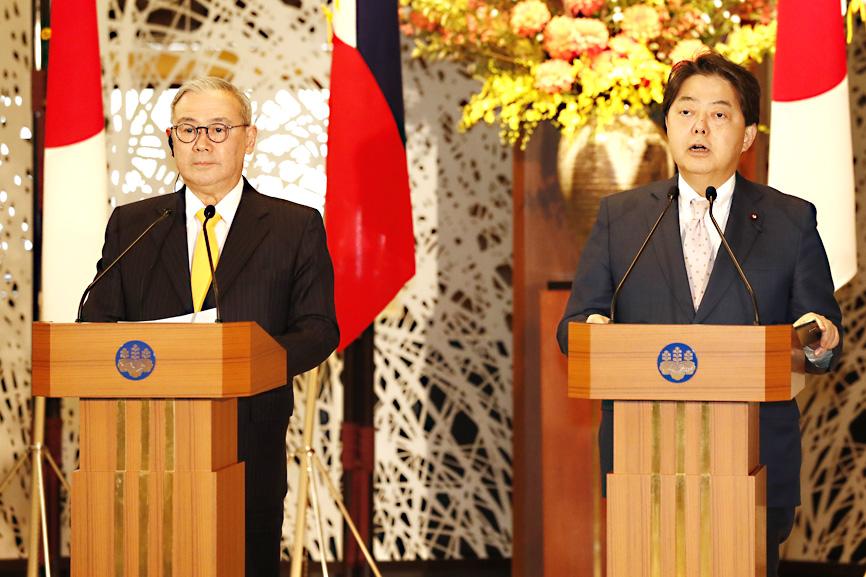Japan and the Philippines yesterday agreed to start talks toward a possible defense agreement that would allow closer cooperation between their militaries amid regional tensions with China and Russia’s invasion of Ukraine.
Japanese Minister of Foreign Affairs Yoshimasa Hayashi and Japanese Minister of Defense Nobuo Kishi, along with Philippine Secretary of Foreign Affairs Teodoro Locsin Jr and Philippine Secretary of Defense Delfin Lorenzana, in their first so-called “2+2” security meeting agreed to begin formal discussions about a possible reciprocal access agreement — a pact that would allow their troops to visit each other’s countries for training, and to exchange defense equipment to increase interoperability and cooperation.
Japan and the Philippines, both US allies, have in the past few years stepped up joint exercises and defense cooperation. In 2020, Tokyo and Manila agreed on the export of Japanese air radar systems to the Philippine military.

Photo: EPA-EFE
The four ministers strongly opposed “actions that may increase tensions” in the East and South China seas, and affirmed their commitment to a rules-based approach to resolving competing claims under international law.
They also said that Russia’s aggression in Ukraine affects Europe and Asia under an international order that does not accept any unilateral change to internationally recognized borders by force.
Although it was implied that China was their main concern, they carefully avoided identifying it by name.
“We agreed that it’s timely to look into the possibility of further expanding our defense cooperation and activities” and to explore ways to conduct capacity and capability building activity “to address issues of mutual concern,” Lorenzana told a joint news conference after the talks.
Kishi said the first “2+2” meeting marks “the beginning of the two countries’ efforts toward further deepening their security ties.”
Japan in January signed a defense cooperation pact with Australia, the first such agreement for Canberra other than with the US.
Japan in the past few years has significantly expanded security talks and joint drills with the US and other partners that share its concerns about China’s assertion of its territorial claims in the region, which is home some of the world’s busiest sea lanes.
Japan is especially concerned about Chinese military and coast guard activity in the East China Sea near the Japanese-controlled Diaoyutai Islands (釣魚台), known as the Senkaku Islands in Japan.
Taiwan, China, the Philippines, Vietnam, Malaysia and Brunei have been locked in an increasingly tense territorial standoff in the busy South China Sea waterway for decades.
Yesterday’s agreement came one day after Chinese President Xi Jinping (習近平) told outgoing Philippine President Rodrigo Duterte that Beijing and Manila have handled their South China Sea disputes properly, and that “regional security cannot be achieved by strengthening military alliances,” Xinhua said.

SECURITY: As China is ‘reshaping’ Hong Kong’s population, Taiwan must raise the eligibility threshold for applications from Hong Kongers, Chiu Chui-cheng said When Hong Kong and Macau citizens apply for residency in Taiwan, it would be under a new category that includes a “national security observation period,” Mainland Affairs Council (MAC) Minister Chiu Chui-cheng (邱垂正) said yesterday. President William Lai (賴清德) on March 13 announced 17 strategies to counter China’s aggression toward Taiwan, including incorporating national security considerations into the review process for residency applications from Hong Kong and Macau citizens. The situation in Hong Kong is constantly changing, Chiu said to media yesterday on the sidelines of the Taipei Technology Run hosted by the Taipei Neihu Technology Park Development Association. With

CARROT AND STICK: While unrelenting in its military threats, China attracted nearly 40,000 Taiwanese to over 400 business events last year Nearly 40,000 Taiwanese last year joined industry events in China, such as conferences and trade fairs, supported by the Chinese government, a study showed yesterday, as Beijing ramps up a charm offensive toward Taipei alongside military pressure. China has long taken a carrot-and-stick approach to Taiwan, threatening it with the prospect of military action while reaching out to those it believes are amenable to Beijing’s point of view. Taiwanese security officials are wary of what they see as Beijing’s influence campaigns to sway public opinion after Taipei and Beijing gradually resumed travel links halted by the COVID-19 pandemic, but the scale of

A US Marine Corps regiment equipped with Naval Strike Missiles (NSM) is set to participate in the upcoming Balikatan 25 exercise in the Luzon Strait, marking the system’s first-ever deployment in the Philippines. US and Philippine officials have separately confirmed that the Navy Marine Expeditionary Ship Interdiction System (NMESIS) — the mobile launch platform for the Naval Strike Missile — would take part in the joint exercise. The missiles are being deployed to “a strategic first island chain chokepoint” in the waters between Taiwan proper and the Philippines, US-based Naval News reported. “The Luzon Strait and Bashi Channel represent a critical access

Pope Francis is be laid to rest on Saturday after lying in state for three days in St Peter’s Basilica, where the faithful are expected to flock to pay their respects to history’s first Latin American pontiff. The cardinals met yesterday in the Vatican’s synod hall to chart the next steps before a conclave begins to choose Francis’ successor, as condolences poured in from around the world. According to current norms, the conclave must begin between May 5 and 10. The cardinals set the funeral for Saturday at 10am in St Peter’s Square, to be celebrated by the dean of the College